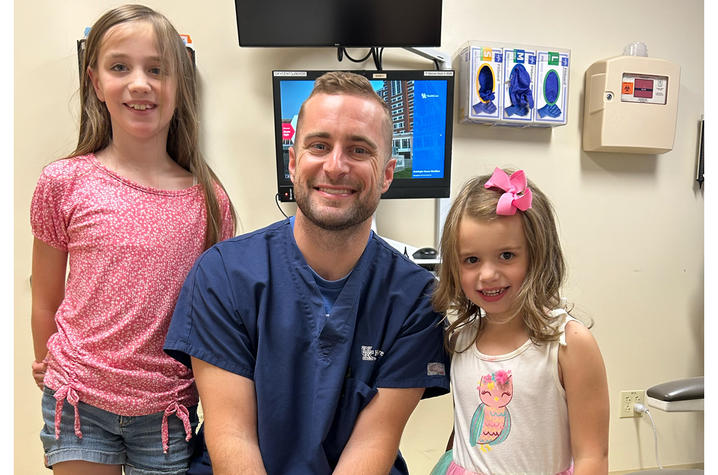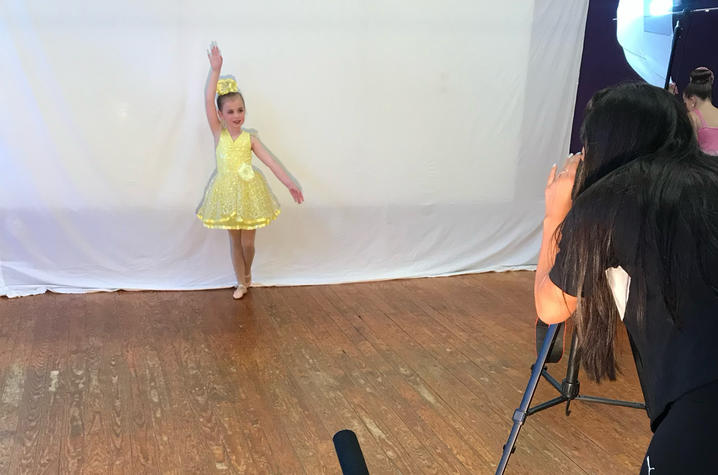When an ear infection needed surgery, Kentucky Children's Hospital physicians stepped up
LEXINGTON, Ky. (March 6, 2024) — Lacey Cundiff knew she had to say something.
Her five-year-old daughter had been sick for days, bouncing between visits to their family doctor and local emergency room — but no one had been able to provide a solid diagnosis. Lacey and her daughter, Anna Kerri, had been directed to UK HealthCare’s Makenna David Pediatric Emergency Center.
For any mom, seeing her daughter in an emergency room bed late at night was both scary and intimidating, but the doctor leaning over Anna Kerri’s bed put Lacey at ease.
“She’s got her elbows on Anna Kerri’s bed. I’m across in one of those chairs next to the bed, and we’re just kind of looking at each other,” Lacey said. “She made me feel comfortable.”
Lacey felt “a nudging from God” and said what was on her heart.
“Mommy wants a CT scan,” Lacey said. “The words just fell out of my mouth.”
On that night in May 2019, the answer was an immediate yes, and the scan revealed bad news. Anna Kerri, who a week earlier appeared to be perfectly healthy, had an abscess on her brain. An ear infection had spread to her mastoid bone, just behind the ear, and was putting pressure on her brain. Anna Kerri needed immediate surgery.
Chris Azbell, M.D., a pediatric otolarynologist with Kentucky Children’s Hospital, was among the doctors who delivered the bad news. He became a calming, lasting force for the family, Lacey said.
Azbell explained the need for surgery, referring to those pivotal CT scans that showed Anna Kerri had mastoiditis and an intracranial abscess that could be life-threatening or cause permanent neurological, hearing and speech damage if left untreated.
"Being able to quickly get on the side of the family and advocate for the patient was really important,” Azbell said.
Justin Fraser, M.D., the director of cerebrovascular surgery and neurointerventional radiology with UK HealthCare’s Kentucky Neuroscience Institute, was on hand to perform the neurosurgery.
“I remember before I went into surgery, laying there, I saw the doctors and then it just went black,” said Anna Kerri, now a 10-year-old who loves to sing, dance, write, play piano and tennis.
'More than just a virus’
The first sign of trouble came days earlier when Anna Kerri was getting ready to get her picture taken for a dance recital.
“Mommy, my ear hurts,” she told Lacey, who checked her daughter’s ear but couldn’t see anything wrong.
When Lacey looks back at the pictures from that day — a Monday — she can see her daughter’s eyes begin to cross, a sign of the infection. At 2 a.m. early the next morning, Anna Kerri started vomiting. It would last for days.
By Wednesday, the family had taken Anna Kerri to their family practice doctor in Danville twice, where they were told it was likely a bad virus. Vomiting, plus an extreme headache, continued. Anna Kerri had been given fluids by the doctor, but she couldn’t keep down ice.
On Thursday, Lacey noticed that her daughter’s eyes, when she could keep them open, appeared crossed. They went to an emergency room in Danville, which didn’t have an available bed and the family was directed to UK HealthCare. Their family practice doctor told the Cundiffs to consider asking for a CT scan.
“I knew how many days she had been sick, and I just kept watching her thinking, ‘This is something more than just a virus,’” Lacey said.
Ear infections are typical for kids statewide, Azbell said. For a pediatric ear, nose and throat specialist like Azbell, seeing an ear infection spread to the mastoid bone and become mastoiditis isn’t uncommon, especially in the winter. Seeing that infection spread inside the skull — like it had in Anna Kerri’s case — is rare.
“The biggest thing I take away from that professionally is how much I appreciate mom advocating for her daughter,” Azbell said. “I think if she had not been as assertive as she was, then that may have been more days lost.”
All smiles
The surgery was a success. Azbell and his team were able to drill behind the ear, remove the infection inside the ear, beneath the ear drum and filling the mastoid bone. Fraser’s neurosurgery team removed the infection from the brain. Ear tubes were put in place.
When the doctors emerged from the hours-long surgery, Lacey felt relief.
“They were all smiling,” Lacey said. “They knew — and I knew — at that moment that she was going to be OK.”
Recovery began with a multi-day stay in the Kentucky Children’s Hospital pediatric ICU, then to the progressive care unit. A multidisciplinary team regularly checked in on Anna Kerri and educated her parents on how to care for her over the next few months of follow-up appointments. The team strength of the hospital shined through.
“We've got all these specialists under one roof. We've got people that do pediatric neurosurgery, like Dr. Fraser, we've got pediatric anesthesiologist, the intensive care unit, the infectious disease specialist, the great hospitalists,” Azbell said. “We work together, we have conferences about these patients, and we can coordinate to take care of anything.”
After months of recovery, Anna Kerri was again a perfectly healthy kid. This May will mark five years since the surgery.
"There’s really no long-term consequences, no hearing loss, no neurologic disability because we were able find it and treat it fast,” Azbell said.
Anna Kerri said she wants to be a scientist “who figures out ways to help the planet.” She enjoys ballet, has taught herself how to play songs on the piano and is in the process of writing a book.
“I like to write mysteries, right now I’m writing one called ‘Beware the Sisters,’” Anna Kerri said. “I also like to write books about school kids.”
Anna Kerri continues to see Azbell for treatment of ear infections and other appointments. Her younger sister, Amelia, has also seen Azbell for ear tubes and other preventative work. Her father, Sean, also comes to UK HealthCare’s Ear, Nose and Throat Clinic to see Beth McNulty, M.D., a neurotologist.
Just a few days after World Hearing Day, the Cundiff family is a positive example of seeking ear and hearing related treatment. They’ve formed a strong relationship with Azbell.
“He's just been such a huge blessing to our family,” Lacey said. “Because we have a direct line to the best.”
Azbell encouraged parents to take any ear infection seriously and not to be afraid to advocate for their child.
“Even if it makes you uncomfortable,” Azbell said, “it’s worth it.”
UK HealthCare is the hospitals and clinics of the University of Kentucky. But it is so much more. It is more than 10,000 dedicated health care professionals committed to providing advanced subspecialty care for the most critically injured and ill patients from the Commonwealth and beyond. It also is the home of the state’s only National Cancer Institute (NCI)-designated Comprehensive Cancer Center, a Level IV Neonatal Intensive Care Unit that cares for the tiniest and sickest newborns and the region’s only Level 1 trauma center.
As an academic research institution, we are continuously pursuing the next generation of cures, treatments, protocols and policies. Our discoveries have the potential to change what’s medically possible within our lifetimes. Our educators and thought leaders are transforming the health care landscape as our six health professions colleges teach the next generation of doctors, nurses, pharmacists and other health care professionals, spreading the highest standards of care. UK HealthCare is the power of advanced medicine committed to creating a healthier Kentucky, now and for generations to come.







